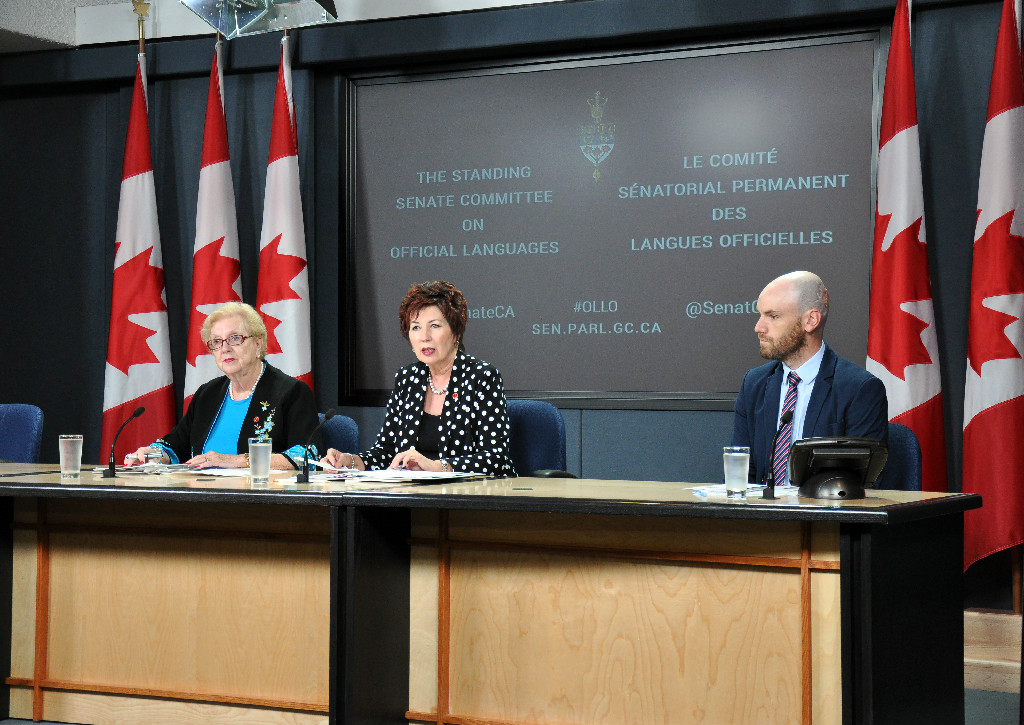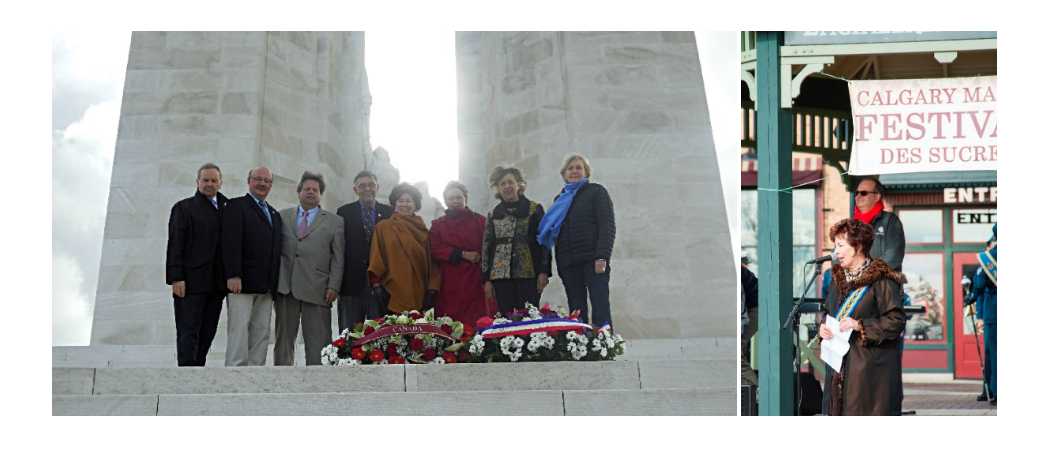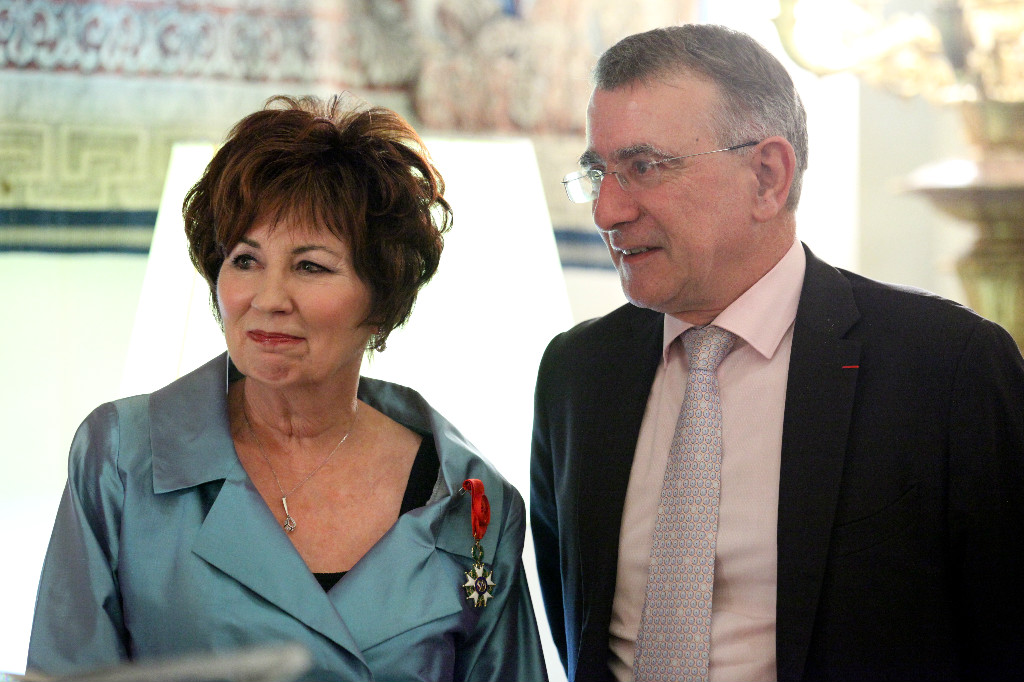Meet Senator Claudette Tardif

Before becoming a senator, you were a professor at the University of Alberta. What inspired you to work in a university setting?
I have always loved learning and been interested in teaching and research, which led me to earn a Master of Education degree and a PhD in Educational Administration. I particularly wanted to work with young adults in the field of education, as well as train future teachers. My goal was to help prepare teachers to work in immersion and French-language schools.
What legislative or public policy issue are you working on in the Senate or in committee?
I am currently working on a statement to promote the Trans Canada Trail. This network of multi-use recreational trails was launched close to 25 years ago and will eventually stretch nearly 24,000 kilometres across every province and territory, from the Atlantic to the Pacific, and up to the Arctic Ocean. It is more than 80% finished. I want to give the project’s proponents a helping hand to ensure it will be completed in the next few years.
Which Senate committees are you currently a member of?
I am the chair of the Standing Committee on Official Languages. I am also a member of the Standing Committee on Agriculture and Forestry and the Special Committee on Senate Modernization.

Why should Canadians take a greater interest in the Senate’s work?
Because the Senate is a vital part of Canada’s parliamentary system. Canada’s founding fathers wanted to make sure there was an upper legislative house – that complements the work of the lower house – to conduct a second, less partisan study of bills proposed by the House of Commons.
Since it was established, the Senate has also ensured that various regions and minority groups were well represented. For example, I represent francophones from Western Canada, among others.
The Senate is also important because it investigates a range of social and economic issues, particularly in committee. I recently worked on studies ranging from the health of bees to the level of bilingualism of Canadian youth. The reports produced at the end of these studies often receive international recognition for their quality.
How have you managed to keep up your French in a province like Alberta, where the vast majority of residents are English-speaking?
My grandmother was a major influence in my life. In fact, my grandparents always emphasized the importance of education and stood by their principles even when times were tough. Thanks to them and to my parents, I learned French at private school and later during my first two years of study at the University of Alberta’s Collège Universitaire Saint-Jean – now the Campus Saint-Jean. Since then, I have been very involved in setting up Alberta’s French-language education system. This system is now very well established and serves more than 80,000 francophone Albertans.
How do you see your role as a senator from an official language minority community?
I definitely think it’s my role to protect the language rights of official language minority communities. Historically, this is also one of the key functions of the Senate. But my role doesn’t end there. I also promote the French language outside Quebec and especially in the West. For example, I have talked to anglophone parents who were thinking of enrolling their children in a French immersion program.
I am always ready to listen to francophone and francophile associations and organizations in my province and at the national level (Association canadienne-française de l’Alberta, Canadian Parents for French, Canadian Association of Second Language Teachers). I frequently attend events held by these groups and by my community.

Can you describe the work of interparliamentary associations such as the Canada-France Interparliamentary Association? You were president of this association from 2009 to 2016 and are now its Vice-President.
The Canada-France Interparliamentary Association is a forum for Canadian and French parliamentarians to share information and ideas. One of the association’s objectives is to promote bilateral cooperation in political, economic, social, cultural and parliamentary areas. The association offers an opportunity to work in the diplomatic sphere and help strengthen relations between France and Canada.
In fact, you were recently made an Officer of the French Legion of Honour. What does this recognition mean to you?
It was an incredible honour and a privilege to receive the insignia directly from France’s ambassador to Canada in the company of my family, colleagues and friends. I was given this award in recognition of my dedication to the Francophonie in the fields of language rights and cultural rights for francophone minorities in Canada, and my contribution to secondary and post-secondary education.

Is there a hidden gem in your region that you think more Canadians should know about?
When Canadians think of Alberta, they think mainly of the Rocky Mountains and places like Banff, Lake Louise and Jasper. Some come here for the Calgary Stampede and to visit ranches in southern Alberta. I highly recommend these tourist destinations. That being said, I think Drumheller and the Alberta Badlands deserve to be high on the list as well, especially Dinosaur Provincial Park and the Royal Tyrrell Museum. Dinosaur Provincial Park has been designated a UNESCO World Heritage Site.
Note to readers: The Honourable Claudette Tardif retired from the Senate of Canada in February, 2018. Learn more about her work in Parliament.
Related articles
Tags
Committee news
Meet Senator Claudette Tardif

Before becoming a senator, you were a professor at the University of Alberta. What inspired you to work in a university setting?
I have always loved learning and been interested in teaching and research, which led me to earn a Master of Education degree and a PhD in Educational Administration. I particularly wanted to work with young adults in the field of education, as well as train future teachers. My goal was to help prepare teachers to work in immersion and French-language schools.
What legislative or public policy issue are you working on in the Senate or in committee?
I am currently working on a statement to promote the Trans Canada Trail. This network of multi-use recreational trails was launched close to 25 years ago and will eventually stretch nearly 24,000 kilometres across every province and territory, from the Atlantic to the Pacific, and up to the Arctic Ocean. It is more than 80% finished. I want to give the project’s proponents a helping hand to ensure it will be completed in the next few years.
Which Senate committees are you currently a member of?
I am the chair of the Standing Committee on Official Languages. I am also a member of the Standing Committee on Agriculture and Forestry and the Special Committee on Senate Modernization.

Why should Canadians take a greater interest in the Senate’s work?
Because the Senate is a vital part of Canada’s parliamentary system. Canada’s founding fathers wanted to make sure there was an upper legislative house – that complements the work of the lower house – to conduct a second, less partisan study of bills proposed by the House of Commons.
Since it was established, the Senate has also ensured that various regions and minority groups were well represented. For example, I represent francophones from Western Canada, among others.
The Senate is also important because it investigates a range of social and economic issues, particularly in committee. I recently worked on studies ranging from the health of bees to the level of bilingualism of Canadian youth. The reports produced at the end of these studies often receive international recognition for their quality.
How have you managed to keep up your French in a province like Alberta, where the vast majority of residents are English-speaking?
My grandmother was a major influence in my life. In fact, my grandparents always emphasized the importance of education and stood by their principles even when times were tough. Thanks to them and to my parents, I learned French at private school and later during my first two years of study at the University of Alberta’s Collège Universitaire Saint-Jean – now the Campus Saint-Jean. Since then, I have been very involved in setting up Alberta’s French-language education system. This system is now very well established and serves more than 80,000 francophone Albertans.
How do you see your role as a senator from an official language minority community?
I definitely think it’s my role to protect the language rights of official language minority communities. Historically, this is also one of the key functions of the Senate. But my role doesn’t end there. I also promote the French language outside Quebec and especially in the West. For example, I have talked to anglophone parents who were thinking of enrolling their children in a French immersion program.
I am always ready to listen to francophone and francophile associations and organizations in my province and at the national level (Association canadienne-française de l’Alberta, Canadian Parents for French, Canadian Association of Second Language Teachers). I frequently attend events held by these groups and by my community.

Can you describe the work of interparliamentary associations such as the Canada-France Interparliamentary Association? You were president of this association from 2009 to 2016 and are now its Vice-President.
The Canada-France Interparliamentary Association is a forum for Canadian and French parliamentarians to share information and ideas. One of the association’s objectives is to promote bilateral cooperation in political, economic, social, cultural and parliamentary areas. The association offers an opportunity to work in the diplomatic sphere and help strengthen relations between France and Canada.
In fact, you were recently made an Officer of the French Legion of Honour. What does this recognition mean to you?
It was an incredible honour and a privilege to receive the insignia directly from France’s ambassador to Canada in the company of my family, colleagues and friends. I was given this award in recognition of my dedication to the Francophonie in the fields of language rights and cultural rights for francophone minorities in Canada, and my contribution to secondary and post-secondary education.

Is there a hidden gem in your region that you think more Canadians should know about?
When Canadians think of Alberta, they think mainly of the Rocky Mountains and places like Banff, Lake Louise and Jasper. Some come here for the Calgary Stampede and to visit ranches in southern Alberta. I highly recommend these tourist destinations. That being said, I think Drumheller and the Alberta Badlands deserve to be high on the list as well, especially Dinosaur Provincial Park and the Royal Tyrrell Museum. Dinosaur Provincial Park has been designated a UNESCO World Heritage Site.
Note to readers: The Honourable Claudette Tardif retired from the Senate of Canada in February, 2018. Learn more about her work in Parliament.


